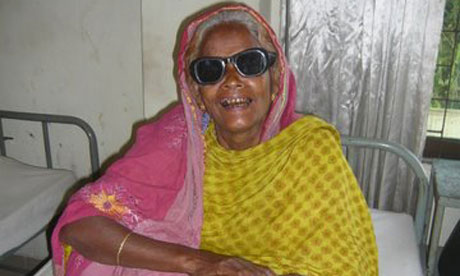
The patient on the operating table is cocooned from head to toe in white with only his right eye exposed. The doctor, looking through a double microscope, makes an incision between the cornea and the sclera – the white of the eye – gently eases out a yellowish lens clouded by cataract and flicks it on to a sheet. He then inserts an artificial lens and closes the eye.
The operation at Vard hospital has taken no more than 20 minutes and the patient will have the bandage removed the next day after an overnight stay. It is simple, quick and costs only £20 – yet the scale of the problem in Bangladesh is huge.
A national survey in 2003 revealed that 750,000 adults and 40,000 children were blind, 80% of whom were affected by easily treatable cataracts. The backlog of cases is set to continue rising with 150,000 new cases each year, due essentially to poverty, a lack of education, free services and trained ophthalmologists in rural areas.
But help is coming from an unusual source: thousands of British diners are paying £1 towards cataract operations in Bangladesh every time they eat a curry.
Vision Bangladesh is a scheme run by the charity Sightsavers and the NGO Brac seeking to raise at least £1m to eradicate 80% of blindness in the Sylhet a region of 12 million people by 2013 and nationally by 2020. Under the "£1 on the bill" scheme, replicating StreetSmart's similar idea for raising money for the homeless, customers at participating restaurants are given the option of donating £1 through their bill. "Sometimes, customers leave £5 or £6," says Shah Athar, owner of Cafe Rasoi in Heathfield, East Sussex, which has raised £3,000. "Some have even paid the whole £20 for the operation when they find out more about the whole scheme."
Penelope Mawson, communications director for Brac UK, has been encouraged at the number of restaurants taking part. "At a time of recession it shows real community spirit that these restaurateurs have backed this scheme," she says.
Cheques are still coming in, but Mawson estimates that the 300 restaurants signed up to the scheme will raise £100,000 in 2011. The plan is to make a £1-on-the-bill an annual event with more and more restaurants joining in. Since its rollout last year, Vision Bangladesh has exceeded targets, carrying out 38,700 cataract operations in 2011 instead of the 30,000 planned, and more than 316,000 people were screened instead of 300,000.
Sylhet a 30-minute flight from the capital Dhaka, was chosen as the launchpad because many Bangladeshis in the UK come from this region, which is known for its pretty tea plantations. The first Sylhetis settled in Liverpool and Humberside through their work in the merchant navy in the second world war. Others worked in the docks in east London.
Sir Fazle Hasan Abed, the founder of Brac, saw the potential of the Bangladeshi diaspora in the UK and its estimated 10,000 Bangladeshi restaurants. When Brac came to the UK last year to drum up support for Vision Banglasdesh, he said: "I want Bangladeshis to help their fellow-Bangladeshis."
At Vard hospital, a 30km drive from Sylhet town past lush green paddy fields, a dozen patients who had their operations the day before are waiting to have their bandages removed. Most are elderly because cataracts – a clouding of the lens – are age-related.
As the bandage comes off her right eye, Shabzan Begum, who gives her age as between 60 and 65, receives a drop and is given a pair of dark glasses. Initially, her reaction is subdued. "I can see clearly, I can see much better than before," she says, without much emotion.
But after a few minutes she cries silently as the enormity sinks in. When someone holds a up flower and asks her whether she can see the colours she replies with a big smile: "Yes, I can see them all and that one is red."
Borhan Uddin, 60, a tailor who had lost his livelihood, says: "I had a shop but lost everything, I had to sell all my machines, live on handouts and for the last two years I could not see anything at all. Now I can go back to work and start life as it used to be."
Some of the British Bangladeshis who have come to the hospital are visibly moved, including Muzahid Khan, a community leader from Greater Manchester. "That operating theatre did it for me," he says. "Seeing that operation crystallised the whole thing; that £20 just came to life right here."

